Discomfort in the genital area, problems with urination and sexual dysfunction - all these symptoms can indicate the development of the diseaseprostatitis.
Unfortunately, in the early stages, the disease practically does not manifest itself at all, therefore the man turns to the urologist too late and the disease can develop into a chronic form.
So what signs should you pay attention to and how to treat chronic prostatitis?
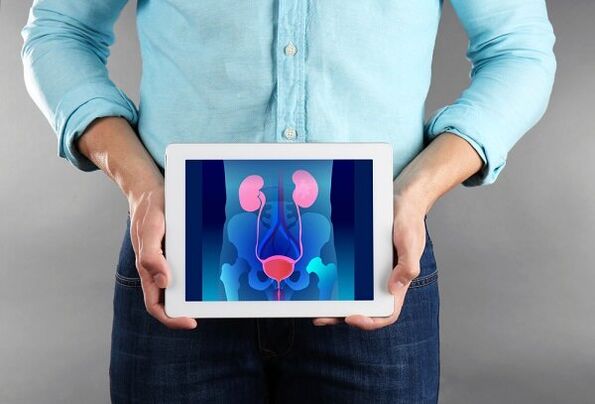
What is chronic prostatitis?
Chronic prostatitis- a prolonged inflammatory process in the prostate. The consequence of the disease is disruption of the gland's activity and its physiological changes.
Over time, a man begins to experience severe discomfort, which directly affects his lifestyle.
This disease is one of the most common problems related to men's health. According to statistics, 50% of men aged 50 and over have prostate problems. The chronic form of the disease is common in young men under 40 years old.
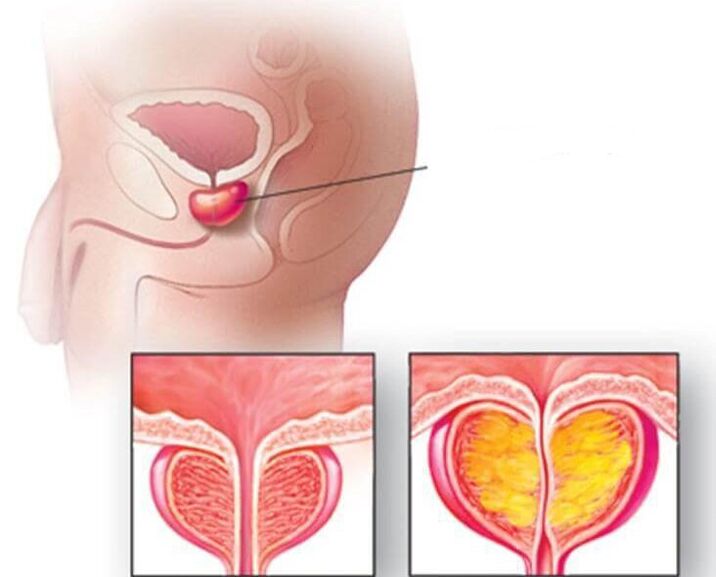
Classify
Chronic prostatitis in men has many forms, varying in symptoms and causes. The following types of diseases are distinguished:
- bacteria;
- implicit;
- no symptoms;
- stagnation.
Characteristic symptoms of the disease as well as treatment depend on the type of chronic prostatitis.

Bacterial form of the disease
This form is the most common and does not cause diagnostic difficulties. Often, the results of urine tests in patients show a high content of leukocytes, which indicates an increase in pathogenic microflora.
The bacterial form of prostatitis can occur due to impaired immunity or as a complication after a previous illness. It is treated with antibiotics and the treatment regimen depends on the type of pathogen.
Latent prostatitis
The latent form can go undetected for up to three months or more. Its second name is pelvic pain syndrome. The cause of the development of the disease can be inflammatory and non-inflammatory processes. The latent form is characterized by the following symptoms:
- increased white blood cell content in test results;
- constant persistent pain in the genital area;
- problems with urination.
The main difficulty in diagnosis is that despite the presence of white blood cells in laboratory tests, the laboratory methods cannot identify the causative agent of infection.
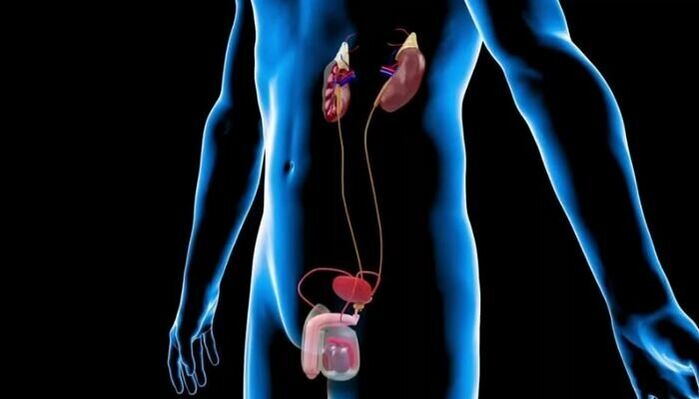
Asymptomatic form of inflammation
The most dangerous form of chronic prostatitis. In this case, changes characteristic of the disease occur in the tissues of the prostate, but there are no symptoms indicating the presence of inflammation. The asymptomatic form is often discovered incidentally or when the disease reaches its critical peak.
After choosing the right therapy, the man's health was completely restored.
Stasis or non-infectious
Non-infectious form of chronic prostatitis occurs due to circulatory disorders in the pelvic organs. This form of the disease accounts for about one-third of all cases of prostatitis in young men. Typical symptoms are difficulty urinating, sexual life disorders and pelvic pain.

Inflammation can be triggered by a sedentary lifestyle, injury, bad habits, etc. v.
Cause of the disease
The reasons for the development of chronic prostatitis are quite diverse. Among the most popular are:
- irregular sexual intercourse or changing partners frequently;
- abstain from sex completely;
- injuries and diseases of the pelvic organs;
- frequent overheating or hypothermia in the pelvic area;
- congenital malformations of the structure of the genital organs;
- untreated infectious or viral disease;
- abuse of bad habits;
- working in conditions where the body is constantly poisoned;
- metabolic diseases;
- problems with the musculoskeletal system.
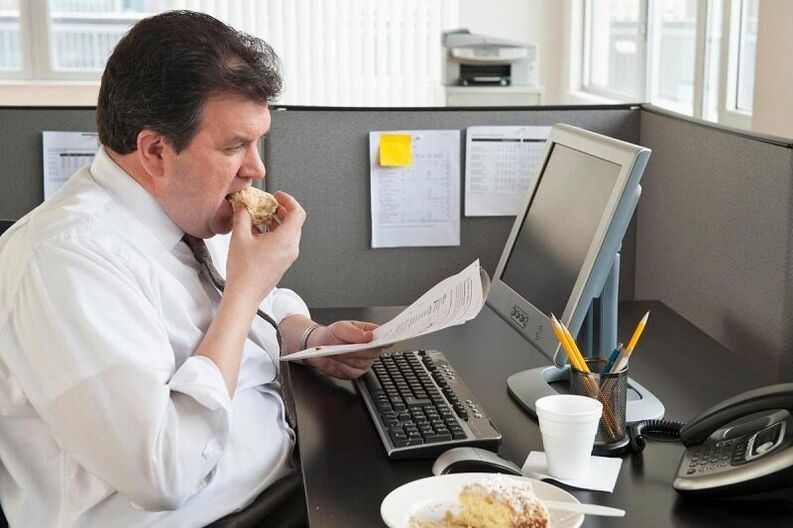
Important!During the treatment of prostatitis, determining the cause of the disease is extremely necessary. This will help not only get rid of the problem, but also avoid its recurrence in the future.
Symptoms of chronic prostatitis
Despite the fact that chronic prostatitis can be asymptomatic for a long time, the following signs may indicate the disease:
- Severe discomfort in the perineum and genitals. The discomfort may be constant or occur at a specific time, such as after urinating.
- Irradiate the pain to the coccyx or pubic area.
- Feeling of a foreign object in the anus, a little closer to the perineum.
- Increased urge to urinate (especially at night).
- Feeling of fullness in the bladder even after emptying the bladder.
- Reduced sexual desire, reduced ability to have an erection.
- Small mixing of blood in the seminal fluid.
- Hemorrhoids.
- Veins protrude through the skin of the scrotum.
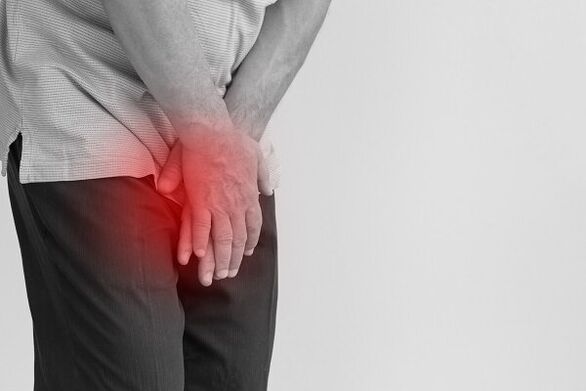
The symptoms described above can lead to the development of neurological abnormalities. Due to frequent urination, a man cannot get enough sleep and work, he begins to have headaches, drowsiness, irritability and even outbreaks of aggression.
Diagnose
Diagnosing chronic prostatitis begins with a visit to a urologist. If the patient is worriedfrequenturination, sexual dysfunction and perineal pain, then the diagnosis is made quickly enough.
Difficulties in diagnosis arise in cases where the disease develops asymptomatically. In this case, the man was prescribed several additional examinations, including the use of special instruments. During the diagnosis process, you can learn from the urologist what prostatitis is and how to treat the disease.
There are the following methods to diagnose chronic prostatitis:
- Take samples for research in the laboratory. This method is suitable for patients with bacterial diseases because it allows identifying the inflammatory agent and choosing the most effective treatment method. Usually, general blood and urine tests are done for research.
- supersonic. If prostatitis is suspected, the patient is referred for a transrectal examination. This method allows you to accurately determine the stage of the disease and evaluate the general condition of the prostate. Additionally, ultrasound can help eliminate the risk of serious complications. In addition, sometimes patients are prescribed repeat ultrasounds to monitor treatment progress.
- CT scan.MRI is indicated in cases where other diagnostic methods are ineffective or the patient is suspected of developing a malignant process in the prostate.
- Determination of PSA content(prostate specific antigen). When PSA is above 4 ng/ml, additional diagnostic procedures will be indicated, including prostate biopsy to rule out cancer.
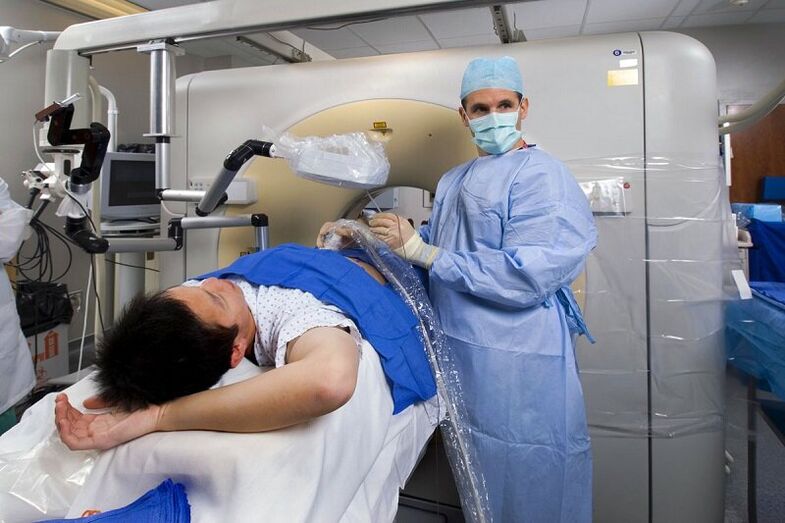
Important!Usually, when diagnosing chronic prostatitis, several methods are combined at once, for example, testing, palpation and ultrasound.
Treatment of chronic prostatitis
Can chronic prostatitis be cured? If chronic prostatitis does not progress seriously, it can be treated. If the disease is brought to the final stage and the walls of the prostate begin to deform, the patient's condition may improve and go into remission.
For successful treatment, it is necessary to promptly consult a competent doctor who will tell you how to cure chronic prostatitis and what to do. The urologist's recommendations should be strictly followed. Treatment should not be interrupted, otherwise relapse may occur.
Currently exists3 ways to treat chronic prostatitis:
- medication (medication);
- non-pharmacological (using a variety of devices and procedures);
- surgery (if not - surgery).
Treatment medicine
Treatment for bacterial and non-bacterial prostatitis is different. In the first case, antibiotic treatment is necessary. But sometimes the treatment regimen may be the same: antibiotics are prescribed for non-infectious forms to check the results.
If improvement occurs, antibiotics should be continued.
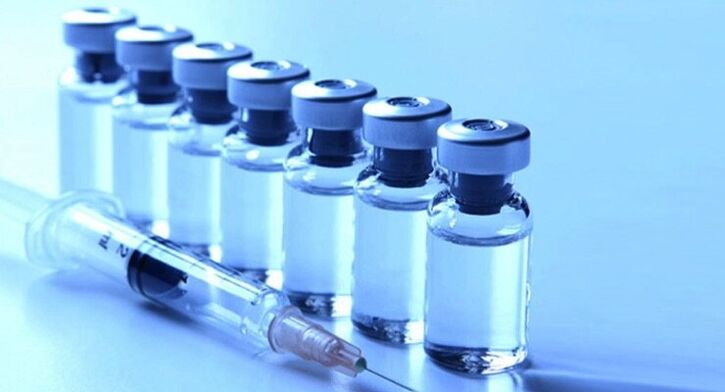
Treatment of chronic prostatitis should be comprehensive. Only in this case can maximum effectiveness be achieved.
For chronic prostatitis, the following medications may be prescribed:
- antibiotic;
- immunostimulants;
- vasodilator tablets;
- antispasmodic drugs;
- anti-inflammatory drugs;
- Vasoprotective drugs (drugs that stimulate the metabolism of blood vessel cells).
Alpha blockers may also be used in treatment but only after a course of antibiotics. Medicines to treat chronic prostatitis help relax the smooth muscle tissue of the prostate and also have a good effect of relieving stress.
In some cases, antihistamines and antidepressants may be prescribed.
Non-drug therapy
Drug treatment is recommended in combination with physiotherapeutic procedures. The following physical therapy procedures are most commonly used:
- Laser therapy.
- Electrophoresis.Special treatment solutions are used to penetrate the tissue using the electrode method.
- Temperature treatmentUse the microwave.
- Phonetics. The diseased organ is exposed to ultrasound waves.
The methods can be used singly or in combination.
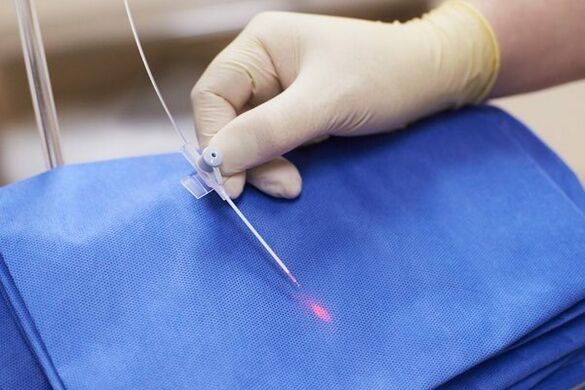
Surgical intervention
If drug treatment and physical procedures do not help, the disease can only be cured with surgery. This happens when chronic prostatitis is complicated by sclerosis processes.
With sclerosis of the prostate, the pathology affects other organs, especially the ducts, from which prostatic secretions are removed, and the seminal tubers. The entire structure of the reproductive organs changes and the man's quality of life is significantly reduced.
In this case, laparoscopic surgery is performed. Even chronic congestive prostatitis can be cured with surgery.
Treatment can be carried out both in budget medical institutions and paid clinics. The cost of treatment depends on the severity of the disease and the duration of the course. Regarding time, early stage prostatitis can be cured in a month, complicated prostatitis can be cured in 3-4 months.

Treatment of chronic prostatitis depends on the patient's health condition, age and lifestyle. If you follow all of your doctor's recommendations, you will most likely make a full recovery.
However, no one guarantees lifelong remission. Patients who have eliminated the cause of the disease will have a higher chance of recovery.
Timely consultation with a doctor is also of great importance. Don't delay diagnosis and treatment of prostatitis. The sooner you get medical help, the lower the risk of any complications.
Treatment at home
Chronic prostatitis can be treated at home if there are no complications. In case the disease recurs many times or is complicated, medication is needed.
To restore men's health, you can also use traditional medicine recipes. This therapy is of an adjunctive nature, that is, it is used as a supplement to drug treatment.
Before using any alternative medicine, you should consult your doctor.
Using folk remedies, you can relieve pain, reduce inflammation, normalize the process of urination and strengthen the immune system as a whole.
Pumpkin seeds
In the treatment of prostatitis, pumpkin seeds are used quite often. They have a large amount of zinc, and the male body especially needs this trace element.
Only dried pumpkin seeds that have not been heat treated are suitable for processing. They just need to be peeled and eaten. For the entire course of therapy, 0. 5 kg of product is enough.
Such courses must be completed annually until complete recovery. Just eating 30-40 seeds a day before meals is enough. Don't rush, the seeds must be chewed thoroughly.
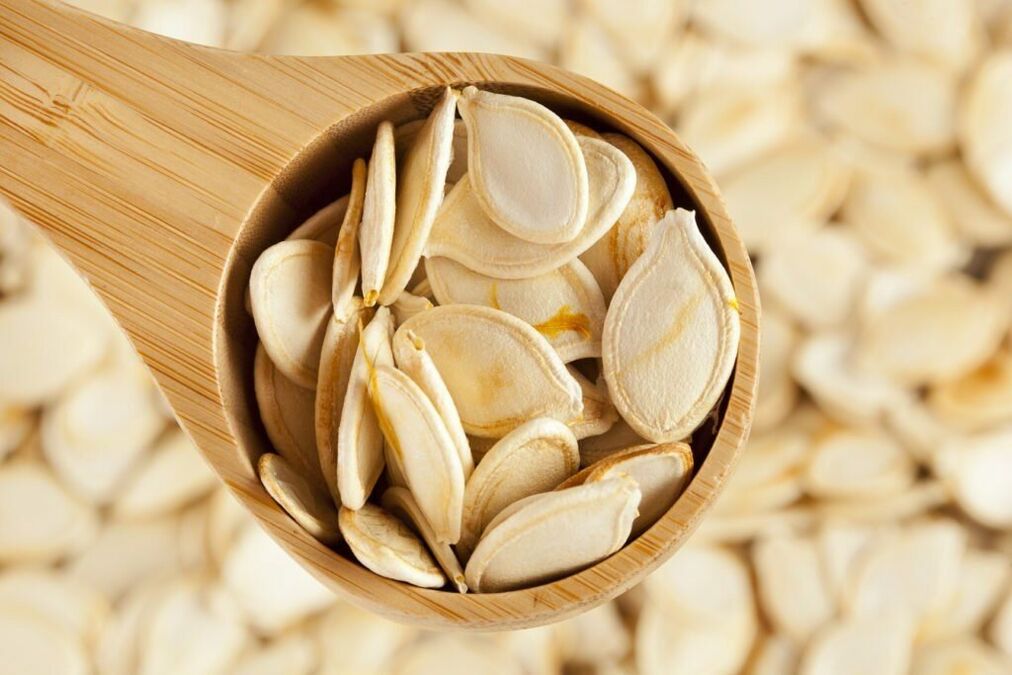
You can also make sweets that are good for men's health. The recipe is very simple: peel the pumpkin seeds, chop them and mix well with honey (200 g).
The result will be a dough-like consistency. Roll small balls with a diameter of 3 cm from this mixture, you should eat 2 balls a day on an empty stomach. These sweets cannot be swallowed immediately but must be chewed for 2-3 minutes.
witch hazel infusion
To prepare a medicinal tincture, you will need leaves or bark of witch hazel. You can brew both ingredients, remember to alternate them. Due to its hardness, the bark takes 2 times longer to compost. To prepare it is necessary to use only fresh ingredients.
The recipe is as follows: 1 tbsp. I. bark or witch hazel leaves, pour 1 cup of boiling water (200 ml), cover and leave for 30 minutes. Then use gauze to stretch it again. Drink 4 times a day, ¼ cup. The treatment course lasts a week.
Sage
This herb has long been famous for its beneficial properties. With its help, you can cope with any infection. To get rid of prostatitis, you need to undergo a complex course of treatment, which includes washing the urethra with infusions and taking wormwood.
You will need 100 g of hay. It needs to be crushed as finely as possible in your hands and sifted through a strainer. The smallest pieces are useful for use in dry form, and larger pieces are useful for preparing infusions, thereby creating urethral and bacterial douches.
Therefore, the body has a dual effect: cleaning itself of infection and reducing inflammation.
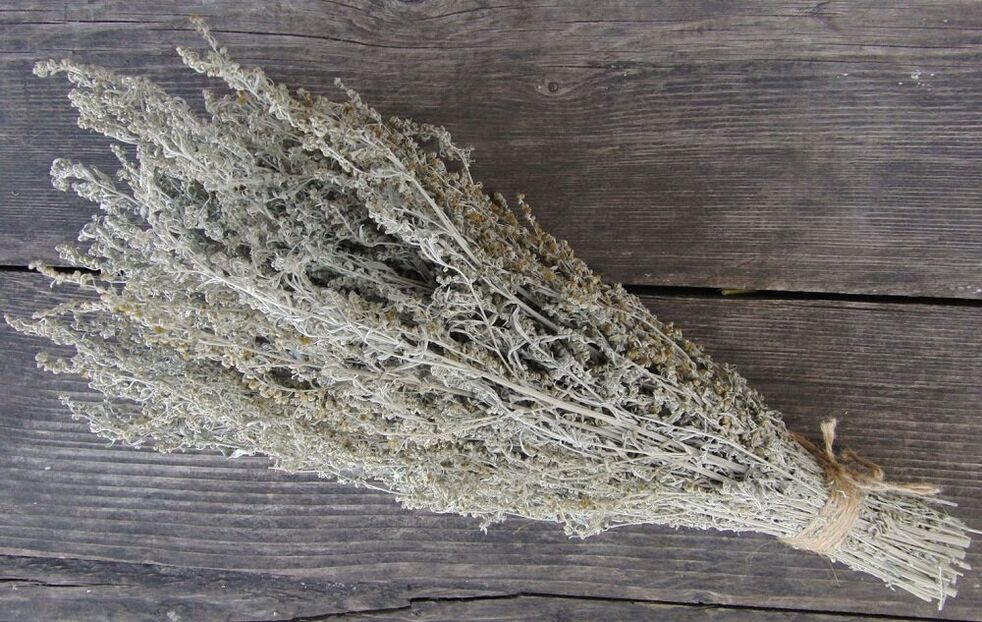
Dried wormwood should be taken once a day with a glass of water. Washes and microenemas are performed every evening. The treatment course lasts a week.
Decoctions for douching and douching are simple to make. 1 teaspoon. Dry herbs pour 1 liter. Boiling water Wait for the broth to cool to 30 degrees then filter the water. For one procedure, 50 ml of infusion is enough. Injections into the urethra and anus are performed using a syringe.
Do not forget that for each procedure you need to use a separate syringe so as not to accidentally get an infection. The broth must be strongly injected into the urethra: this way the liquid will move far.
Medicinal juice
To effectively treat chronic prostatitis, you can drink fruit juice. It is better to drink fresh vegetable juice; drinks fromasparagus and cucumbers, beets, carrots. You need to drink 600 ml per day. The course of treatment is 10 days.
If there are contraindications, it is necessary to consult a specialist.
Disease prevention
Prostatitis is quite difficult to treat and tends to recur. That is why men aged 30 and over need to pay attention to disease prevention.
Key prevention measures include:
- have a regular sex life with one partner;
- play sports and special exercises;
- take multivitamins to strengthen the immune system;
- sleep compliance and alertness;
- reduce stressful situations;
- refuse bad habits;
- Regular check-ups with a colorectal specialist;
- Timely treatment of colds and viruses.
Prevention should concern all areas of human activity, from nutrition to sexual intercourse. It is important to understand that prostatitis is curable and you can continue to live an active and full life.

























